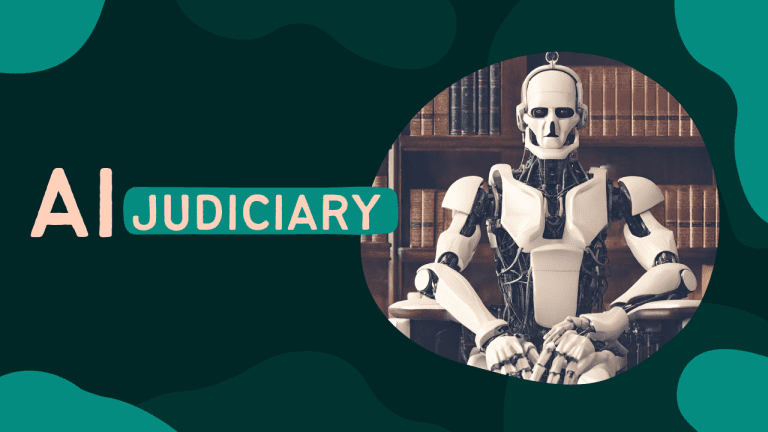The judiciary, a cornerstone of any democratic society, plays a pivotal role in ensuring justice and upholding the rule of law. However, the legal system faces numerous challenges, including an overwhelming backlog of cases and the need for timely, informed decision-making. Enter artificial intelligence (AI), a transformative force that holds the potential to reshape the legal landscape in unprecedented ways. In this article, we’ll explore the ways AI can redefine the judiciary of the future, from aiding advocates in crafting compelling arguments to empowering magistrates to expedite justice.
AI-Assisted Legal Research and the Impact of Generative AI
Legal research is a critical aspect of the legal profession, requiring extensive analysis of case law, statutes, regulations, and legal precedents. AI-assisted legal research is a transformative development that leverages artificial intelligence to streamline and enhance the research process for legal professionals. Within this context, Generative AI, a subset of AI that includes models like GPT-3, can have a significant impact. Let’s delve into AI-assisted legal research and how Generative AI can contribute to this field.
AI-Assisted Legal Research
AI-assisted legal research involves the use of artificial intelligence, particularly natural language processing (NLP) and machine learning (ML) techniques, to help legal professionals gather and analyze legal information more efficiently. Here’s how it works:
- Data Collection: AI systems can access and aggregate vast amounts of legal data, including court decisions, statutes, regulations, legal textbooks, and academic articles. This data is often available in digital repositories, making it accessible for AI algorithms.
- Document Analysis: AI systems use NLP algorithms to analyze and extract relevant information from legal documents. This includes identifying key legal concepts, citations, and arguments presented in case law.
- Legal Research: AI algorithms can search and retrieve specific legal documents based on user-defined queries. These queries can be complex and include natural language input, allowing legal professionals to express their research needs in a more human-like manner.
- Summarization and Insights: AI can generate concise summaries of lengthy legal documents, making it easier for lawyers to grasp the essential points of a case quickly. It can also identify legal precedents, helping legal professionals understand how specific legal issues have been addressed in the past.
- Predictive Analysis: Advanced AI models can predict the relevance of specific legal precedents to a given case, which can assist lawyers in building stronger arguments and anticipating potential counterarguments.
Generative AI in Legal Research
Generative AI, exemplified by models like GPT-3, brings a unique capability to AI-assisted legal research. Here’s how it can impact this segment:
- Natural Language Understanding: Generative AI models can understand and generate human-like text, which makes them exceptionally useful for processing and generating legal documents, such as contracts, briefs, and legal opinions.
- Automated Document Generation: Legal professionals can use Generative AI to automate the generation of legal documents. For example, it can help draft contracts, wills, or legal correspondence by providing templates and generating text based on user input.
- Legal Writing Assistance: Generative AI can assist lawyers in crafting persuasive legal arguments and drafting documents. It can suggest legal language, provide precedents, and even offer alternative phrasing to improve the clarity and effectiveness of legal documents.
- Customized Legal Research: Generative AI can assist in creating tailored legal research reports by summarizing relevant legal documents, providing insights, and generating citations automatically.
- Multilingual Support: Many Generative AI models are proficient in multiple languages, which is advantageous for legal professionals working with international clients or dealing with legal materials in different languages.
However, it’s important to note that while Generative AI can offer significant advantages in legal research and document generation, it should be used with caution. Legal professionals must review and verify AI-generated content to ensure accuracy, compliance with legal standards, and ethical considerations.

Predictive Analytics for Case Merits
AI’s predictive capabilities extend beyond legal research. Machine learning algorithms can be trained on historical case data to predict the potential outcomes of new cases. By analyzing factors such as case details, precedents, and the judge’s track record, AI can estimate the likelihood of success for a given case.
This predictive power can benefit both advocates and their clients. Advocates can use AI-generated insights to assess the strengths and weaknesses of their arguments, enabling them to make more informed decisions about case strategy. Clients, in turn, can have a clearer understanding of their legal standing and potential outcomes, helping them manage their expectations.
Reducing Backlogs and Expedited Justice
One of the most pressing issues in many legal systems worldwide is the backlog of pending cases. Overloaded court dockets can lead to delayed justice, creating frustration among litigants and undermining public trust in the legal system.
AI can play a vital role in alleviating this backlog. Automated case management systems can prioritize cases based on their complexity, urgency, and available resources. AI algorithms can assist magistrates in making efficient scheduling decisions, thereby reducing delays in court proceedings. Additionally, AI-powered document analysis can speed up the review process by quickly extracting relevant information from legal documents and streamlining administrative tasks.
Conclusion
As we stand on the precipice of a new era in the legal system, the integration of AI promises to redefine how justice is delivered. From enhancing legal research to predicting case merits and expediting justice, AI technologies hold the potential to revolutionize the judiciary. While there are ethical and privacy considerations to address, the benefits of a more efficient and accessible legal system are undeniable.
By embracing AI, the judiciary can become more agile, responsive, and equitable, ensuring that justice is not only blind but also swift. As we move forward, it is crucial for legal professionals, policymakers, and society as a whole to collaborate and harness the full potential of AI in the service of justice. The future of the judiciary is here, and it’s AI-driven.

